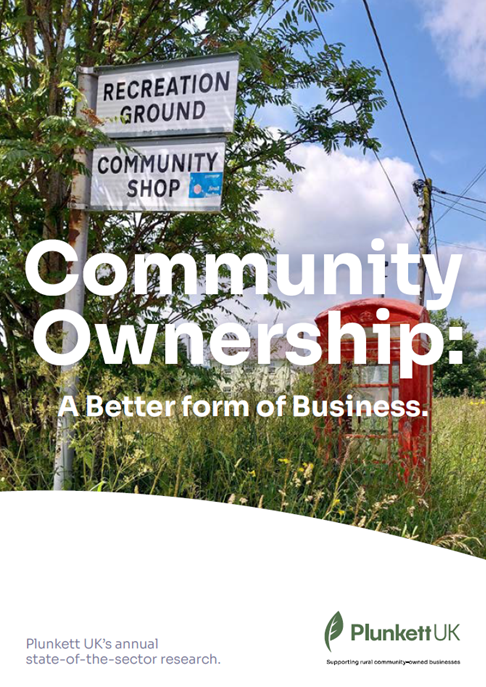T: 01822 851370 E: [email protected]
Community Ownership: A Growing Movement That Is Bucking The Trend
 Community-owned businesses are growing in number and remain a robust, sustainable model, according to research published this week by Plunkett UK.
Community-owned businesses are growing in number and remain a robust, sustainable model, according to research published this week by Plunkett UK.
According to Plunkett’s Community Ownership: A Better form of Business report the sector saw its biggest single year of growth – at 3.8% - since before the pandemic. Furthermore, despite facing significant challenges the long-term survival rate of all community businesses remains remarkably high at 94%.
During 2023, 35 new community-owned businesses opened, and, despite six closures, this took the total to almost 800 trading entities across the UK. Amongst a diverse network, community-owned pubs remain the UK’s fastest growing type of community business.
With the new Government pledging to grow the UK’s co-operative and mutual economy, Plunkett’s research clearly demonstrates that the community-owned business model is well placed to play a significant role in this agenda. With appropriate support from politicians and policymakers, this democratic and inclusive form of business can expand further and create greater impact in communities.
Eight of the businesses supported by Plunkett that opened in 2023 received funding from the UK Community Ownership Fund, introduced by the Conservative-led Government, with others securing support from a diverse range of funders and investors. It demonstrates that when the sector is backed by advice, support and funding, as well as being able to raise significant start-up capital themselves, this impactful form of business can become established in communities UK-wide.
The research highlights key messages around five key themes:
- Despite facing challenging trading conditions, a third of community owned businesses were able to invest surpluses to support local community action, and a quarter made donations to charity.
- The impacts of the cost of living and inflation remain a concern for community-owned businesses – however around half of community-owned businesses are confident or very confident that their situation will improve in the next 12 months.
- More than eight in ten businesses have been negatively impacted by rising energy bills in the last 12 months, and over half of the network believe that grant funding to invest in energy saving and efficiency measures would benefit their business.
- Some 9% of businesses have been negatively impacted by rising staffing costs, however, in recognition of their commitment to fair and equitable employment opportunities, 60% of the network pay the Real Living Wage or higher.
- Community shares continue to leverage significant ‘other’ investment in the sector. We found that for every £1 raised via community shares in 2023, groups attracted a further £2.33 from other sources of funding.
Chris Cowcher, Plunkett UK’s Head of Policy, says:
“The role these businesses play at the heart of communities across the nation is truly remarkable and, despite facing significant challenges in the recent past, to see a growing sector, with continuing high long-term success rates, bodes well for the future.”
This is a people-powered movement, with Plunkett data showing that, on average, community shops have 28 volunteers and community pubs have 19 volunteers who help on a regular basis.
An estimated total would be about 11,500 volunteers supporting community shops across the UK and around 3,500 volunteers at all community pubs, with a further 4,500 volunteers supporting other kinds of business supported by Plunkett.
Chris adds:
“Whether in a volunteering or employment capacity, or as community shareholders or fundraisers, this genuinely is a sector with a diverse community at its heart. Businesses that are owned by, run by and run for the benefit of local people are a fantastic example of how to build sustainable, thriving and inclusive places where everyone is welcome.”
As a result of the A Better form of Business research, Plunkett will include the following specific ‘asks’ in its ongoing external affairs work:
- To support energy efficiency measures for trading businesses.
- To reduce the overall burden of business rates on those trading from ‘physical premises’.
- To support the growing sector with a ‘Community Right to Buy’ assets of value to local people.
- To seek clarity on the future of the Community Ownership Fund.
Read the research in full HERE.
 |



